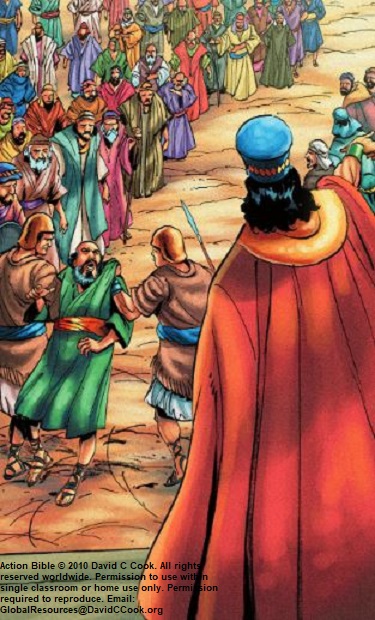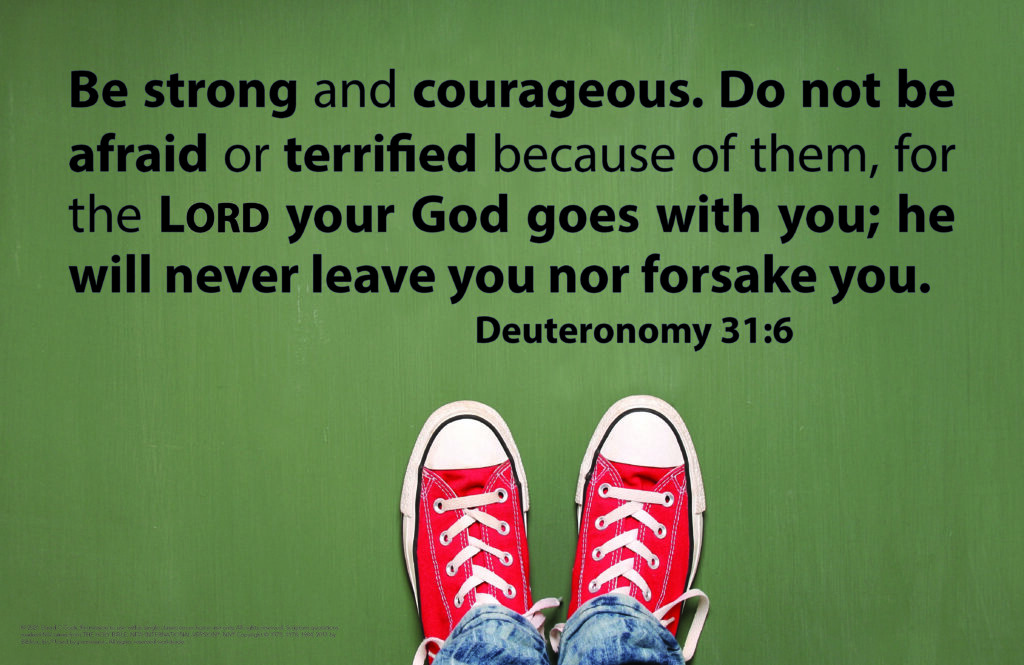During the lesson, the information for you to know is written in regular type, and what we suggest speaking or reading aloud to children is in bold. All resources for this lesson, including the Teacher Guide, Student Page, Family Connection Card, and other resources can be downloaded in a ZIP file by clicking on the following link:
In some lessons you will find "resource articles." These are articles written by experts from around the world to help equip you for your work with children and adolescents. Share them with parents or guardians if you consider it appropriate.
The messenger who had gone to summon Micaiah said to him, “Look, the other prophets without exception are predicting success for the king. Let your word agree with theirs, and speak favorably.” But Micaiah said, “As surely as the Lord lives, I can tell him only what the Lord tells me.”
1 Kings 22:13–14
In today’s lesson, you will learn about the prophet Micaiah, who was asked to speak the truth in a difficult situation. It took courage for the prophet to speak truthfully to the king. He knew that the king already did not like him because he had spoken truthfully before. Think about your own life. Are there times when telling the truth could affect your relationships, reputation, or safety? How do you think you would choose to respond in these circumstances?
Sometimes telling the truth will bring hard results like it did for Micaiah—he ended up in prison! Telling the truth does not guarantee that every situation will have a happy ending. Ask God to give you courage to always speak the truth.
Let the families of your students know that their children will be learning about telling the truth in difficult situations. Encourage them to talk about why truthfulness may take courage.
Teacher Tip: If possible, email or text the Family Connection Card to the families of your students.
Welcome the children and ask them to share if the gravel they received last week reminded them to tell the truth.
Let’s play a quick game.
Tell the children to sit in a circle. Have them cup their hands together in their laps and close their eyes. Tell them you have three small rocks that you will give to three different children. The children will hide the rocks in their hands so no one can see them. Everyone should keep his hands cupped and eyes closed. That way, no one will know who has the rocks.
Walk around the outside of the circle several times and secretly give the rocks to three children. Ask the children to open their eyes. Ask a volunteer to come to the centre of the circle. Be sure that the child in the centre is not one who has a rock. Explain that the volunteer will guess which students have the rocks. She will choose a child in the circle and ask, “Do you have a rock?” All the students should answer truthfully. If the child does not have a rock, he will answer truthfully and remain in the game. If he does have a rock, he will answer truthfully and leave the game. Remind the children that they should respond with the truth, even if it means they must leave the game.
Play the game three times, giving different children the rocks and having different volunteers try to guess who has them.
It is hard to be truthful when you may suffer for telling the truth. Sometimes lying may seem easier than telling the truth, especially in difficult or dangerous situations. Raise your hand if you have ever been in a situation where you or someone else might have been hurt if you had told the truth.
Pause for children to raise their hands.
Telling the truth is always the right thing to do, even in hard situations. Today we will learn more about telling the truth in hard and dangerous situations. We will hear a Bible story about a man who chose to tell the truth to the king, even in very difficult circumstances.
This true story is about a man who was a prophet of the Lord. A prophet was someone who spoke God’s words to the people. This man’s name was Micaiah.
At this time Ahab, the king of Israel, asked Jehoshaphat, the king of Judah, if he would go to war with him against an enemy. Jehoshaphat agreed to go if Ahab would ask for God’s direction first.
So Ahab called in 400 prophets and asked them what to do. But these prophets were influenced by idol worship. They were not prophets, or representatives, of the One True God. They always told King Ahab what they thought he wanted to hear. So they told Ahab and Jehoshaphat that God would give them victory if they went to war.
Jehoshaphat asked if there were any true prophets of the Lord who would tell them the truth from God no matter what. Ahab reluctantly agreed to bring in Micaiah. Ahab did not like him because he never said anything good about Ahab. Ahab was an evil king who did not like hearing the truth from God.
When Micaiah came, Ahab asked him, “Micaiah, should we go to war, or should we stay home?”
Micaiah told the king, “Go! You will be victorious!” He gave the same answer as the false prophets. However, Ahab must have been able to tell that Micaiah did not really mean what he said, because Ahab told Micaiah to speak nothing but the truth.
Micaiah replied, “Israel will be like a flock of scattered sheep without a shepherd if you go to war.” Ahab got angry and ordered that Micaiah be put in prison until Ahab and his army returned victoriously from battle.
If possible, show The Action Bible images as you tell the story.

Then Micaiah declared to King Ahab, “If you return safely, the Lord has not spoken through me. Remember my words!”
Ahab would not listen to Micaiah’s advice. However, the king decided to be cautious. Rather than wearing his royal clothing, he disguised himself by dressing like a regular soldier. But an arrow hit him between the sections of his armour, and Ahab was killed in battle—just like the prophet Micaiah had predicted would happen.

They told him he would win the battle.
At first he told the king he would win the battle. Then he told the king the truth that he would lose the battle and be killed.
He did not like him because he spoke the truth.
Telling the truth is always the right thing to do. However, sometimes it takes courage to tell the truth, especially if you know the other person does not want to hear the truth or you think it might put you or someone else in danger.
Allow children to share. If you have an example from your life, share it now.
We learned in earlier lessons that God is the source of truth. When we tell the truth, we reflect His character. It is always right to tell the truth. We also learned that lying always results in negative consequences, even if they do not happen right away.
However, bad things can still happen to us when we tell the truth. As we saw in this story, Micaiah was thrown in prison for speaking the truth. When hard things happen as a result of speaking the truth, it is important to remember that God promises never to leave us. He will always love you and be with you.
Telling the truth is hard. When you are afraid to tell the truth, think about these words from the Bible:
Read Deuteronomy 31:6 from your Bible. Read it several times. Ask your children to join you in saying it as they are able.
Be strong and courageous. Do not be afraid or terrified because of them, for the Lord your God goes with you; he will never leave you nor forsake you.
Deuteronomy 31:6
Here are some tips to help you tell the truth in hard situations:
I will read some situations. After I read each one, think about how you would respond. If you would tell the truth, say quietly to yourself, “I will tell the truth.” If you are not sure you feel ready to tell the truth in the situation, say quietly to yourself, “I am not sure if I could tell the truth yet.” It is okay if you are still thinking about how to respond. It is better to think through these situations than to quickly do what others are doing. Remember to think of how you can use the 3 tips we just learned!
Pause for children to think of their responses.
Pause for children to think of their responses.
Pause for children to think of their responses.
Many of you will face difficult situations this week where you will have to decide if you will tell the truth. Remember that God is with you and will help you! Let’s say Deuteronomy 31:6 together as a reminder of this amazing truth!
Show the Memory Verse poster if you are using it.
Be strong and courageous. Do not be afraid or terrified because of them, for the Lord your God goes with you; he will never leave you nor forsake you.
Deuteronomy 31:6

Let your children know that you are always available to help them if they need the advice of a trusted adult.
Optional: If you are using the Student Pages, allow the children to commit to telling the truth on these.

Close class by praying this blessing based on Deuteronomy 31:6 over the children:
Blessing: When telling the truth is hard or scary, remember that God is with you. May He give you the strength and courage to always speak the truth!
Lead the students in singing this quarter’s song, if possible.
Life on Life ©2020 David C Cook. Reproducible for home or classroom use only. All other uses require written permission from David C Cook [email protected]. All rights reserved.